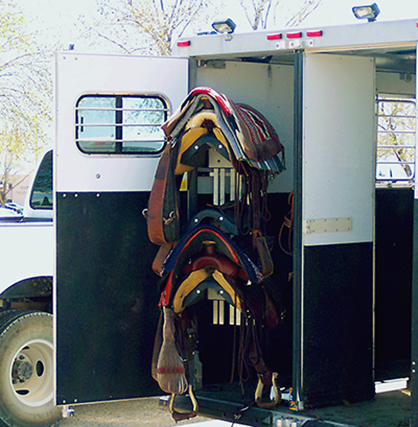Strangles: How to Protect Your Horse
 by: Zoetis
by: Zoetis
Horses travel more than ever before, and whether traveling down the road or across the country, travel or exposure to horses that do can leave your horse at risk for additional disease threats. One of the most common equine diseases, as well as one of the most contagious, is strangles.1
Strangles, caused by the bacteria Streptococcus equi (S. equi), is a highly contagious upper respiratory disease most common in young horses. It also has several potentially fatal complications and the capability to cause persistent infections in populations of asymptomatic carrier horses. 2
Symptoms of strangles can include fever, nasal discharge, difficulty swallowing, abnormal breathing, swelling and/or abscesses of the lymph nodes.1
“Commonly, a horse with strangles will have profuse nasal discharge and swollen submandibular lymph nodes,” said Kevin Hankins, DVM, MBA, senior veterinarian, Equine Technical Services, Zoetis. “With strangles, about 10 percent of horses don’t fully recover from the disease and can then become persistent carriers.2 Unfortunately, persistent carrier horses don’t show the outward clinical signs that sick horses do.”
Due to the lack of outward signs in carrier horses, strangles can spread quickly and easily through a barn or herd because of its ability to be transmitted through direct animal-to-animal contact or by objects such as bridles, buckets or human hands.
Protecting Your Horse
Biosecurity protocols such as observation and screening of newly arriving horses help to prevent the spread of disease. However, vaccination is the best way to combat strangles.
Pinnacle® I.N. is the only two-dose, modified-live bacterial vaccine developed to help prevent strangles. Given intranasally, the vaccine helps provide a more natural immune response, stimulating innate and mucosal immunity at the site of natural infection. Additionally, it avoids local injection-site reactions that can occur with parenteral S. equi vaccines. 2
Because strangles is classified as a risk-based disease, Dr. Hankins recommends vaccinating your horse against this costly disease if:
- Your horse travels or is frequently exposed to unfamiliar horses at shows or in a boarding barn
- Your horse is traveling to a location where strangles is a persistent problem
- Your horse is exposed to high pasture stocking densities (two or more horses per acre)
- Your horse is susceptible due to lack of prior vaccination or natural exposure
If your horse meets any of these risk criteria, vaccination with Pinnacle I.N. is recommended. Speak with your veterinarian about your horse’s disease risk and the benefits of vaccination.
About Zoetis
Zoetis is the leading animal health company, dedicated to supporting its customers and their businesses. Building on more than 60 years of experience in animal health, Zoetis discovers, develops, manufactures and markets veterinary vaccines and medicines, complemented by diagnostic products, genetic tests, biodevices and a range of services. Zoetis serves veterinarians, livestock producers and people who raise and care for farm and companion animals with sales of its products in more than 100 countries. In 2016, the company generated annual revenue of $4.9 billion with approximately 9,000 employees. For more information, visit www.zoetisUS.com.
1 American Association of Equine Practitioners. Strangles (Streptococcus equi). 2008. https://aaep.org/horse-owners/owner-guidelines/owner-vaccination-guidelines/owner-risk-based-vaccination-guidelines. Accessed August 7, 2017.
2 Sweeney CR, Timoney JF, Newton, JR, Hines MT. Streptococcus equi infections in horses: Guidelines for treatment, control, and prevention of strangles. J Vet Intern Med. 2005;19:123-134.
All trademarks are the property of Zoetis Services LLC or a related company or a licensor unless otherwise noted.
© 2017 Zoetis Services LLC. All rights reserved. EQB-00016










